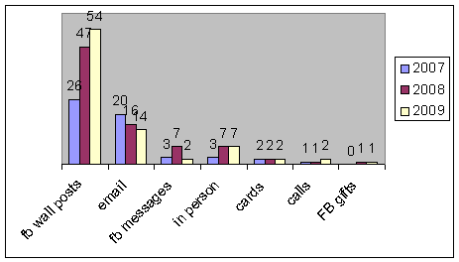Communications becoming more public 3.0
Birthday greetings are the proxy for that
This is the third year that I’ve tracked my birthday greetings as they have moved from private channels to public channels, primarily facebook. As I noted previously, in 2007 and 2008;
Social networks have changed the dynamic – it isn’t enough to wish someone a happy birthday, but it is also important to be SEEN to wish someone a happy birthday. Equally, it is important to be SEEN to have a lot of people wish you a happy birthday too!
This year the shift continued but was much less pronounced, as the graph below shows:

It’s somewhat notable that despite the huge increase of Twitter usage there were no happy birthday tweets. The use case is off. The tweeter would be sending a birthday greeting to the wrong audience – to their followers, not to mine.
The other notable point is that there is an overall increase in the number of birthday greetings over 2007. This is consistent with the obvervation in a recent edition of the Economist’s Intelligent Life magazine, that we are all writers now:
Go back 20, 30 years and you will find all of us doing more talking than writing. We rued literacy levels and worried over whether all this phone-yakking and television-watching spelled the end of writing.
Few make that claim today. I would hazard that, with more than 200m people on Facebook and even more with home internet access, we are all writing more than we would have ten years ago. Those who would never write letters (too slow and anachronistic) or postcards (too twee) now send missives with abandon, from long thoughtful memos to brief and clever quips about evening plans. And if we subscribe to the theory that the most effective way to improve one’s writing is by practicing—by writing more, and ideally for an audience—then our writing skills must be getting better…
True, much of what is written online is quotidian, informational, ephemeral. But writing has always been so: traditional newspapers line bird-cages a day later; lab reports describe methodology in tedious detail; the founding fathers wrote what they ate for lunch. And the quality of many blogs is high, indistinguishable in eloquence and intellect from many traditionally published works.
Our new forms of writing—blogs, Facebook, Twitter—all have precedents, analogue analogues: a notebook, a postcard, a jotting on the back of an envelope. They are exceedingly accessible. That it is easier to cultivate a wide audience for tossed off thoughts has meant a superfluity of mundane musings, to be sure. But it has also generated a democracy of ideas and quite a few rising stars, whose work we might never have been exposed to were we limited to conventional publishing channels.
So thanks for the birthday wishes, and be thankful that we’re all writing more!
(For more from Jeremy, visit his blog)
